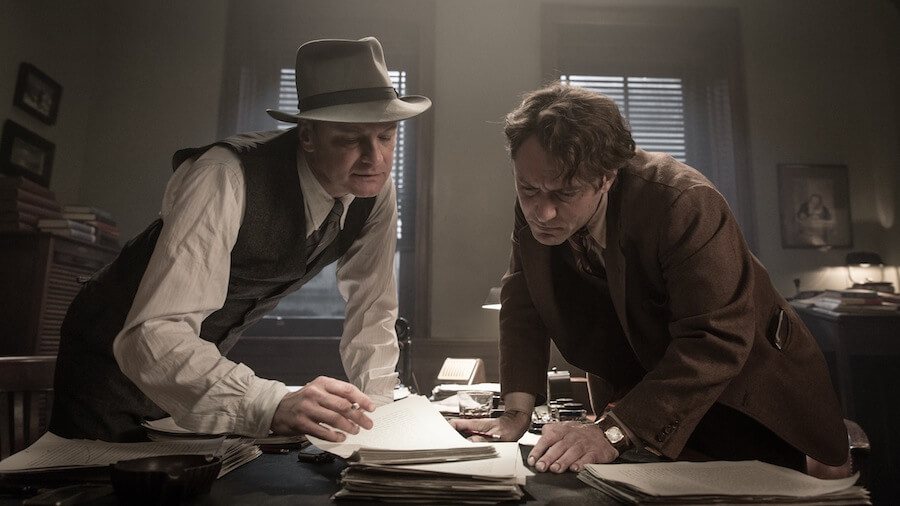‘Genius’ “You don’t know what it’s like to be aliiiiive,” Jude Law brays in his sing-songy Foghorn Leghorn twang. “Genius” is that kind of biopic: where history is writ broad and large, hamminess reigns and real-life figures are turned into machines dispensing overwrought declamations and clumsy exposition. It drops us into the New York literary scene of the 1930s, and so naturally Guy Pearce’s F. Scott Fitzgerald is forced to crow inelegant drivel like, “I should have died when I was 24 — right after ‘This Side of Paradise.’” RELATED: Interview: Lizzy Caplan talks “Now You See Me 2” and being sick of the question “Are women funny?” But “Genius” is also a different, more worthy type of history lesson: one with a genuinely novel hook. No, it’s not that it shines light on two key figures, one no longer as renowned as his contemporaries, the other almost entirely obscure except to experts and fans. It’s that it dedicates half its length to one of the most important parts of writing: chiseling and refining prose, like one would a sculpture from a block of stone. A split biopic that becomes a bromance, “Genius” dwells on the relationship between brilliant but self-destructive/doomed author Thomas Wolfe (Law) and Maxwell Perkins (Colin Firth), the stern man who served as his overworked editor at Scribner’s. Perkins was the man who discovered both Fitzgerald and Hemingway. Wolfe was another big find: a yokel from the backwoods of North Carolina, a child of god divinely gifted with words that flow from him like water. But Wolfe can barely contain his gift. He needs someone to tame him. Indeed, when he manages to slip Perkins his first tattered manuscript — initially titled “O Lost,” soon rechristened the slightly snazzier “Look Homeward, Angel” — it’s so thick it requires the precise gouging of over 300 pages. Wolfe’s sophomore effort, “Of Time and the River,” is even more of a bear, forcing the pair to hack it up painstakingly over the course of two wild, shouty years. At first the editing part is ignored: Wolfe drops his bulky rough draft on Perkins’ desk, then we jump to the aftermath, with Wolfe purring about how the process was most satisfying. You might wish that’s what the movie was about — and then, once the “Of Time and the River” era begins, all of a sudden it is. The best scenes dwell on Perkins ruthlessly breaking down his stubborn, oft-soused colleague’s flowery prose, with Law battling him word-for-word. He even takes umbrage with the writer’s most rhapsodic passages. One purple extract gets cut, not because it’s not beautiful — it is — but because it’s ultimately meaningless, the definition of overwriting. RELATED: Interview: Yo-Yo Ma talks “The Music of Strangers” and building bridges, not walls These scenes should be too inside baseball, but “Genius” finds a way to make them palatable to art house audiences, and without subjecting them to much dumbing down. Moreover, it fliesin the face of most biopics, which usually see artists as fragile gods and people like Perkins as destructive killjoys. An entire film could have been dedicated solely to the pair’s backs-and-forths; Steven Soderbergh would have murdered it. Instead it gets a script by “Gladiator”’s John Logan, who turns it into a middlebrow weepie, which is thrilling when it gets into the nitty gritty, and thumb-twiddling when it does anything else. It winds up giving short shrift to two women — Nicole Kidman, as Wolfe’s frazzled ladyfriend, and Laura Linney, playing Perkins’ goodly wife — who both exist largely to be ignored. At worst our heroes are a Borscht Belt duo: Law goes to 11, belting out boasts like, “I bring you stuff rich, right from my GUT,” while Firth sits there, frozen, waiting to spike him with a droll comeback. Wolfe exists not just to churn out ecstatically received bestsellers but to teach Perkins to chill out, to embrace life and, at one point, to learn what jazz is all about. As a movie about literary editing, it’s not flabby; it’s airtight. But it’s been pounded into the wrong shape. Follow Matt Prigge on Twitter @mattprigge
Director: Michael Grandage
Stars: Colin Firth, Jude Law
Rating: R
2 (out of 5) Globes
‘Genius’ is half a great movie about writing, half a waste of time

Roadside Attractions


















